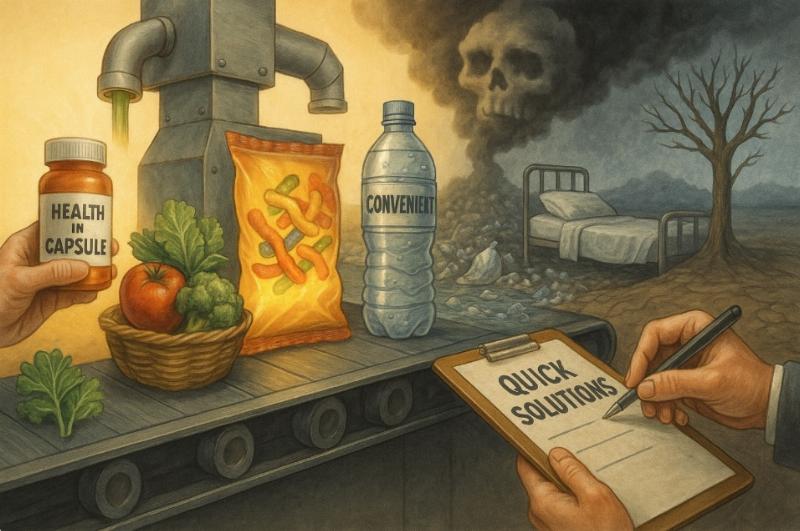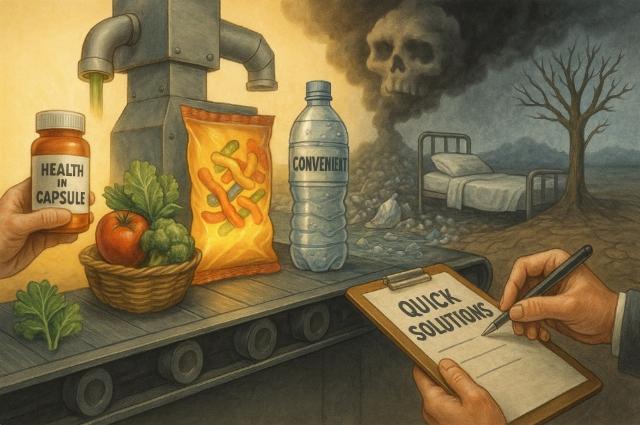


Americans are obsessed with speed, savings, and convenience, which means the temptation to “take the easy way out” has never been more powerful. It is also dangerous. We feel we are being pragmatic by choosing expedience—that is, quick fixes over long-term solutions, or even comfort over conscience—that result in downstream consequences in our personal, social, and moral lives.
Taking the easy way isn’t necessarily obvious and can look like fiscal responsibility, technological progress, or even personal freedom. However, the reality is one of avoidance, short-sightedness, and harm—both to others and to ourselves.

Image by ChatGPT.
We’re hearing it debated in the media lately. Americans are questioning one of the most common modern shortcuts of substituting low-cost synthetic chemicals for safer, natural, or more ethical alternatives. Companies may use these substitutions to keep prices low and profit margins high, but it’s often at the expense of human well-being and environmental health.
Consider the long list of endocrine disruptors found in plastics, cosmetics, and cleaning products—many of which were chosen not for safety, but for affordability and ease of production. We now know that compounds like BPA and phthalates are linked to cancer, infertility, and neurological disorders.
This is a moral failure. Prioritizing cost over safety knowingly shifts harm to future generations.
In infrastructure and maintenance, short-term thinking is equally destructive. A contractor might apply a cheap sealant to fix a leaky roof, knowing full well it will deteriorate in a year—but it’s fast, affordable, and checks the box.
This mindset is pervasive in many organizations and governments. Budget constraints or political pressure lead to band-aid policies like temporary aid programs to underfunded health systems that solve nothing but look good in the moment.
The cost of this behavior is compounding debt, failing systems, and eroding public trust. The moral failure is that we delay responsibility while knowingly increasing the burden for others later.
There are few decisions as morally complex as ending a human life. Yet, at times, our society treats these choices as final solutions to complex problems—a very grim form of expedience.
Abortion is often framed solely in terms of personal freedom or hardship avoidance, but rarely do public conversations focus on supporting alternatives that preserve both life and dignity. We can expand maternal healthcare, adoption access, and other forms of support if we value the lives of the unborn.
War, while sometimes justified in defense, is most commonly the result of diplomatic failure, economic ambition, or cultural contempt. How often has violence been chosen because it was easier than negotiation, compromise, or justice?
The death penalty, too, is justified as swift justice, but it bypasses the slow, uncertain process of rehabilitation or the search for answers to the root causes behind crime.
These are not easy topics, but they follow a pattern. Difficult problems are too often met with permanent, irreversible solutions. These options are chosen because they are decisively simple regardless of their morality.
In personal health, we also seek shortcuts. We want pills instead of engaging in lifestyle changes. We want pain relief, but we don’t accept the real challenge of root-cause healing or prevention.
A patient with high blood pressure may be prescribed a cocktail of medications—yet still eat poorly, sleep poorly, and remain sedentary. A person suffering from depression may receive pharmaceuticals without also being encouraged to build purpose, connection, and self-discipline. Modern medicine saves lives. But when treatments are used to avoid accountability, they become crutches rather than cures. We often end up masking symptoms and ignoring the deeper causes—loneliness, trauma, addiction, fear.
Taking the easy way out is a personal and cultural failure. We have built systems that reward speed over wisdom, appearance over substance, and relief over resolution.
But there is a moral cost to every shortcut. Whether in business, health, justice, or personal life, the question must be asked: Are we solving problems, or just moving them down the road?
Real responsibility is hard. It requires patience, discipline, and long-range thinking. It is also the only path to real progress, dignity, and healing. As individuals, we can choose long-term wellness over instant comfort. We can model personal responsibility and teach our children the value of enduring effort. As communities, we can support systems and leaders that prioritize sustainable solutions—not political optics. As a society, we can rethink policies that choose expedience at the cost of justice or life.
The easy way out may seem efficient—but it’s often a mirage. Real integrity demands that we face hardship with courage, not conceal it behind temporary fixes. Let us dare to choose the harder right over the easier wrong—not because it’s easier, but because it’s right.
